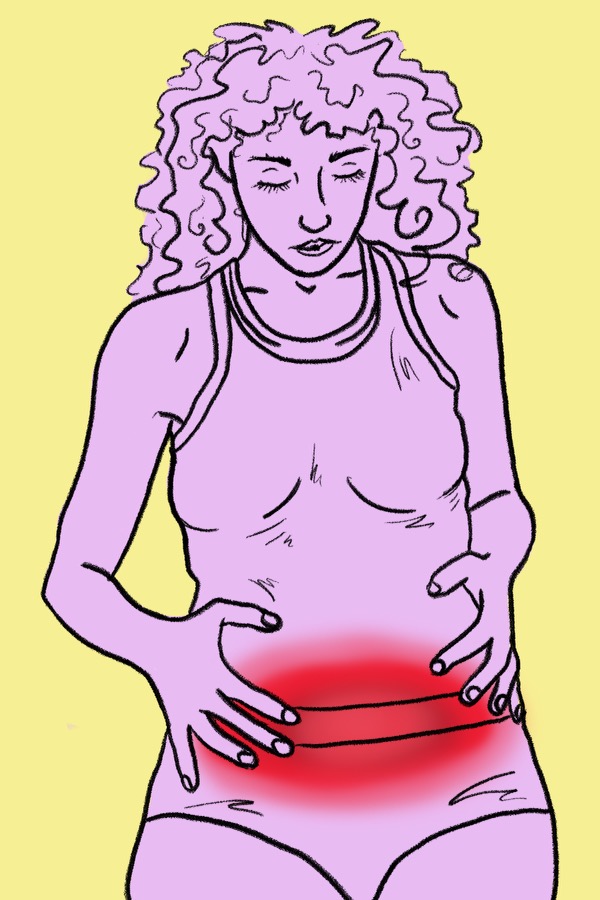Picture this: You’re starting your day. It’s looking productive and you’re feeling good. The vibes are right. Creativity and productivity are flowing through your veins. Suddenly, there’s a pulsing pain squeezing your abdomen. “I’ll be fine, it’ll pass,” you tell yourself. It only worsens — ruining the vibes, and your livelihood. As the pain becomes unbearable. You start to feel the blood gushing out.
This sounds like a horror story, but millions of people have to deal with this while on their periods — myself included.
Throughout high school and college, I’ve struggled with severe cramps. My cramps would get so bad to the point where I would occasionally throw up. It’s happened twice this year and I received little sympathy or concern from my doctors and instructors.
Symptoms vary widely, as external factors such as stress, sleep patterns and diet can influence pain levels. Goodrx explains that high levels of stress can lead to painful periods, more severe PMS symptoms and irregular periods.
Which is great for college students like me, who are not stressed at all, eat right every day and always get optimal sleep.
This lack of empathy around menstrual complications speaks to a larger issue: women’s pain – and struggles of anyone who isn’t a cisgender man – has historically been ignored and belittled by society. Politicians need to implement policies that combat this negligence.
Let’s look at Spain, the latest country to offer workers paid menstrual leave. In February, Spain passed a law guaranteeing up to five days of paid leave for incapacitating periods.
Spain’s equality minister, Irene Montero, said recently in parliament if people do not have basic rights such as menstrual leave, they are not full citizens. And she is right.
The U.S. should follow suit. Denying people care and sympathy for something that is completely natural – also against their will – is unfair and inhumane.
Acknowledging gender politics at play here is key to understanding why menstrual pain isn’t taken more seriously. People’s perception of individual pain is heavily influenced by a person’s gender. In the study Conceptualising Gender and Pain in Modern History by Whitney Wood and Joanna Burke, they break down how medical experts perceive women’s pain tolerance as higher than men’s. A majority of people even agreed with this statement — but far fewer men believe the statement to be true than women.
There are multiple studies that show the perceived discrepancy between men’s and women’s pain. A 2001 study from the University of Maryland Francis King Carey School of Law found women’s pain will be treated less severely by medical professionals. Another study from the Society for Academic Emergency Medicine reported that women will often wait longer to receive help than men.
Some fear that menstrual leave policies will lead to discrimination against women and other menstruating people because of their “weakness.” Barkha Dutt, a columnist for The Washington Post, said in an opinion article that she believes menstrual leave is unnecessary and will just lead to more sexism. Dutt argues that people use menstrual pain as an excuse for special treatment – and how menstrual pain requires “no more than a Tylenol or Meftal, and if needed, a hot-water bottle.”
This is simply untrue, not to mention unfair.
Those who experience periods aren’t looking for excuses to receive “special treatment.” Many suffer severe pain during their periods that prevents them from everyday activities like work. It would be inhumane to force them into work or make them use sick days for something their cisgender male counterparts will never experience.
The diminishing of women’s pain is nothing new. But I want to dispel the notion that gender discrimination in healthcare doesn’t impact male-identifying people as well. Similarly to women, men have been taught to deal with pain in specific ways, which typically translates to hiding their suffering.
Acknowledging the gender discrepancy in menstrual pain helps us as a society better understand and sympathize with the pain of others. Just because one person experiences something that we don’t doesn’t mean that it’s any less real.









